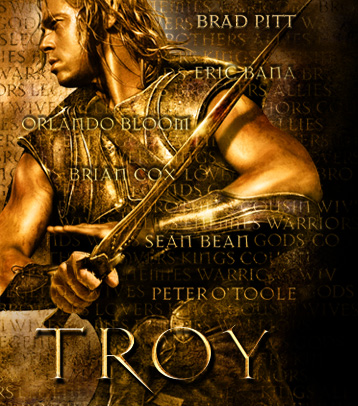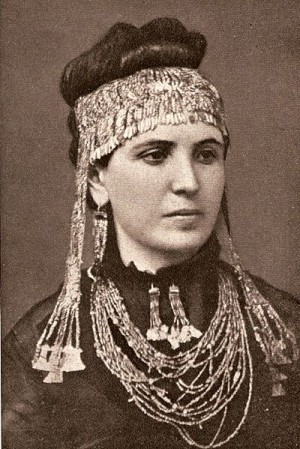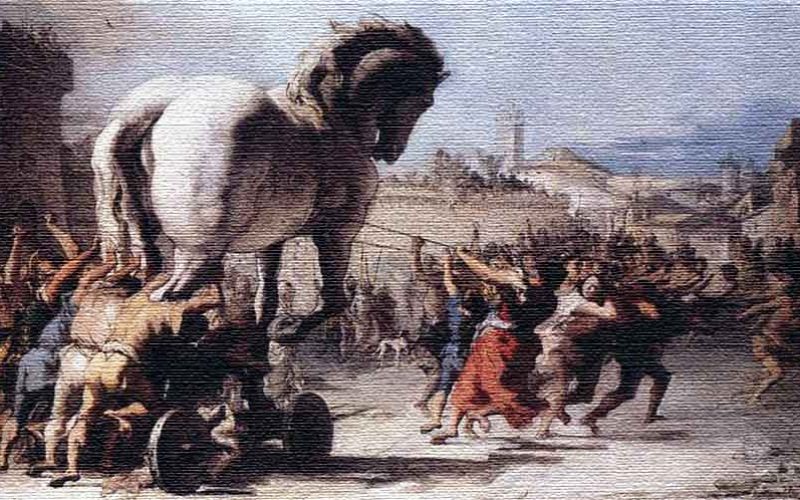Hisarlik.
Turkish for “Place of Fortresses.”
It falls from the tongue, sibilant and mysterious. The modern name for ancient Troy, destroyed by the love of a woman.
Heinrich Schliemann (1822-1890), the man who proved the truth of Homer’s epic, was born 190 years ago today. “I have opened up a new world for archaeology,” Schliemann said after he finished excavating Troy in 1873.
He was a passionate lover of classical antiquity, a self-taught polyglot who spoke 14 languages, a self-made millionaire who retired at age 36.
But his detractors claim that he destroyed Troy to find its riches, planted and falsified artifacts, and twisted reality to suit his fantasies.
Yet without Schliemann, Hisarlik would be just another mound of dirt. Who was he, really?
The Straight Story
Schliemann was born on January 6, 1822, in the small town of Neubuckow, Germany. His father, Ernst, was a Protestant minister. His mother died when he was 9.
At bedtime, Ernst would recite the Iliad and the Odyssey to young Heinrich, filling his mind with heroic images. Then Ernst got caught embezzling church funds. At age 14, Schliemann was forced to apprentice at a grocery store and work 15-hour days.
One day, the drunken miller’s assistant staggered in, ready to prove he was above his post. He recited from Homer’s Iliad — in Greek. For Schliemann, it was a staggering revelation. He plied the fellow with Schnapps and begged him to repeat the passage over and over again. He remembered his father’s bedtime tales and vowed to uncover Homer’s Troy.

After five years at the grocery store, Schliemann enlisted as a cabin boy on the Dorothea, bound for Venezuela. A bit of a detour, but Schliemann had a plan. Two weeks out, however, the Dorothea capsized in a storm. Schliemann, one of the few survivors, washed ashore on an island in the North Sea. He was taken to a hospital in Amsterdam, and eventually found employment there as an office boy.
Schliemann knew that trade was the vehicle to wealth, and language skills the ticket. In two years, he taught himself English, French, Dutch, Spanish, Portuguese and Italian. After this, he claims, he was able to learn a language in six weeks. By 1844, an import-export firm hired him as their agent in St. Petersburg and he did well (despite the fact he never quite mastered Russian).
In 1850, Schliemann learned his brother had died a wealthy investor in the California gold fields. He traveled to Sacramento to settle his brother’s estate, then bought and resold over a million dollars of gold dust in six months.
Until a local Rothschild agent complained he’d short-weighted their consignments.
Schliemann hightailed it back to Russia pleading illness, and married Ekaterina Lyschin, niece of one of his rich friends. He amassed a small fortune trading in indigo dye. He then cornered the black market in gunpowder materials during the Crimean War. By 1858, at age 36, he retired a wealthy war profiteer.
In 1859, the year Darwin published On The Origin Of Species, Schliemann toured Greece and Asia Minor without Ekaterina. She had their three children to raise and no desire to travel.
Schliemann’s obsession with Troy resurfaced when he met Frank Calvert, a British diplomat, who claimed that he had found Troy on his family farm in Turkey. The site was known locally as Hisarlik.
Schliemann divorced Ekaterina. At age 47, he wed Sophia Engastromenos, age 17. Her cousin, the Archbishop of Athens, recommended her as a suitable assistant for Schliemann’s grand plan to prove the truth about Troy.

Next: Troy, the not-so-straight story, and the man behind Agamemnon’s Mask…
